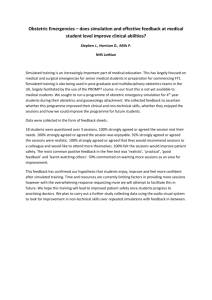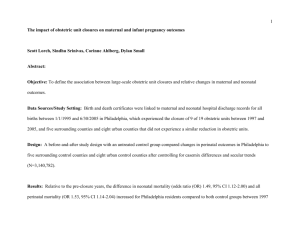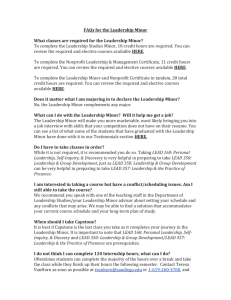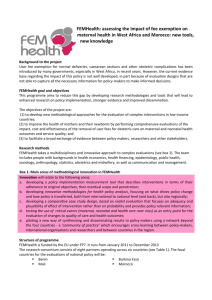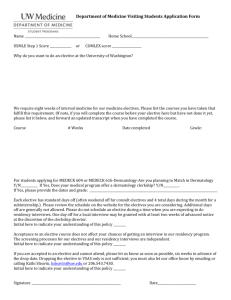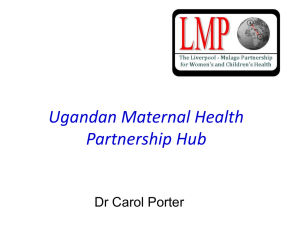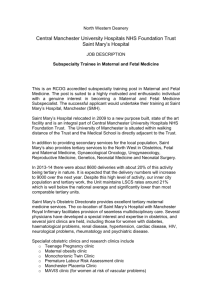Maternal Mortality and Obstetric Complications at St Augustine`s
advertisement
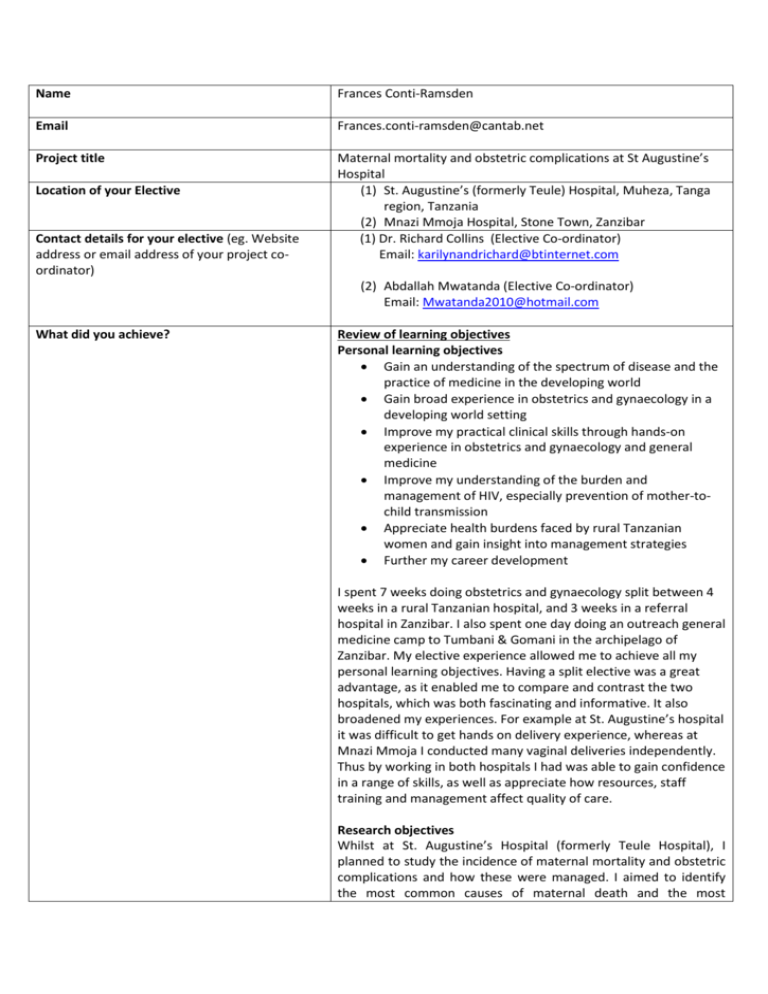
Name Frances Conti-Ramsden Email Frances.conti-ramsden@cantab.net Project title Maternal mortality and obstetric complications at St Augustine’s Hospital (1) St. Augustine’s (formerly Teule) Hospital, Muheza, Tanga region, Tanzania (2) Mnazi Mmoja Hospital, Stone Town, Zanzibar (1) Dr. Richard Collins (Elective Co-ordinator) Email: karilynandrichard@btinternet.com Location of your Elective Contact details for your elective (eg. Website address or email address of your project coordinator) (2) Abdallah Mwatanda (Elective Co-ordinator) Email: Mwatanda2010@hotmail.com What did you achieve? Review of learning objectives Personal learning objectives Gain an understanding of the spectrum of disease and the practice of medicine in the developing world Gain broad experience in obstetrics and gynaecology in a developing world setting Improve my practical clinical skills through hands-on experience in obstetrics and gynaecology and general medicine Improve my understanding of the burden and management of HIV, especially prevention of mother-tochild transmission Appreciate health burdens faced by rural Tanzanian women and gain insight into management strategies Further my career development I spent 7 weeks doing obstetrics and gynaecology split between 4 weeks in a rural Tanzanian hospital, and 3 weeks in a referral hospital in Zanzibar. I also spent one day doing an outreach general medicine camp to Tumbani & Gomani in the archipelago of Zanzibar. My elective experience allowed me to achieve all my personal learning objectives. Having a split elective was a great advantage, as it enabled me to compare and contrast the two hospitals, which was both fascinating and informative. It also broadened my experiences. For example at St. Augustine’s hospital it was difficult to get hands on delivery experience, whereas at Mnazi Mmoja I conducted many vaginal deliveries independently. Thus by working in both hospitals I had was able to gain confidence in a range of skills, as well as appreciate how resources, staff training and management affect quality of care. Research objectives Whilst at St. Augustine’s Hospital (formerly Teule Hospital), I planned to study the incidence of maternal mortality and obstetric complications and how these were managed. I aimed to identify the most common causes of maternal death and the most common obstetric complications at the hospital, and hoped to gather sufficient data on the management of these cases to allow analysis of causative factors in adverse outcomes, enabling me to make simple recommendations that may aid management of future patients. In terms of my research, I encountered several obstacles meaning I did not achieve what I had initially planned to. Primarily there was very poor record keeping, namely the obstetric admissions book had so little data that I had to go back to the original patient files. This proved to be very time consuming, so rather than being able to look at a whole year of obstetric admissions as I had intended, I only had time to look at one month. Documentation in the files was also very poor, meaning that often it was very difficult to discern what the management had been. Similarly, in the cases of maternal deaths, most of the patient files from 2013 were missing, so I was unable to gather the data I had hoped. Therefore many of the recommendations arising from my work focused on the importance of accurate documentation, and strategies to achieve this. However, even if I had had more information on management, it also became clear to me that the complexity of the issues which lead to poor management in individual cases are not amenable to a ‘simple recommendation’ as I had hoped. There were personal, cultural and institutional factors implicated, which would require a lot of thought and time to address. Impact of my elective On practical terms, there were two material ways in which St. Augustine’s Hospital benefitted from our presence. The first is that we all paid hospital fees, which went directly into a training fund for the local staff. This enables staff to travel to the UK and receive specific training, such as how to carry out obstetric ultrasound scans. We also brought equipment with us from the UK, including suture materials, sterile gloves, surgical masks, and BNFs, which were greatly appreciated. Similarly, at Mnazi Mmoja hospital, we paid hospital fees that were used for training and development at the hospital. In terms of clinical work, given our relative inexperience, I did not do any formal teaching, rather would make suggestions and recommendations as I thought appropriate. Therefore the most significant impact I made was through the findings of my research on obstetric complications and maternal mortality (please see continuation sheet: ‘Obstetric complications and maternal mortality at St. Augustine’s Hospital’ for further details). Whilst I was not able to address many of the complex problems at the hospital, I hope that my suggested changes to the obstetric clerking proforma will ensure fewer mothers who are HIV positive slip through the net, and that gestational age will be routinely calculated, so that preterm labour will be identified and acted on. Would you recommend this location / project to others? Further comments (eg. Travel advice, tips for organising an elective similar to this etc.) Absolutely! My elective was the most intense, challenging and enjoyable experience I have ever had. I was able to get plenty of hands-on experience in obstetrics and gynaecology, and had a lot of responsibility with patients - a fantastic learning experience. In terms of holiday activities, Tanzania has an incredible amount to offer, with opportunities for safari, trekking, snorkelling and water sports to name a few! We saw chameleons whilst trekking in the stunning Usumbara mountains, saw elephants, lions, giraffes, hyenas and more on safari in the Serengeti and Ngorogoro crater, stayed in some incredible beach resorts, and learnt to kitesurf on a spotless beach in Zanzibar! Tips for organising elective: - Start early! Both hospitals are very popular with students and often get booked up a year in advance. The electives network is a great source of information. Planning early also gives you time to apply for grants and bursaries. - If you are going to a rural/poorly resourced hospital, try and found out if there is anything useful you could take with you to the hospital. Gloves, masks, obstetric wheels, and sutures may be greatly appreciated! - If you want to do publishable research there is a lot of paperwork to be done, including fees and ethical clearance, so you need to organise that with plenty of time (Around a year). - Climate: Technically we were there in the rainy season (April-June). For the most part this meant a few showers a day, otherwise it would be beautiful most of the time. However in May there were times when it did rain a LOT. Although it sounds ridiculous, wellies and umbrellas did come in useful! - There are some negative aspects to be aware of: 1. Unless you are a Kiswahili speaker, you do rely on local staff to translate for you in Tanzania, so if you want to be able to assess patients independently and take histories, this may not be the best location for you. 2. The standard of living can be very basic. Our accommodation in mainland Tanzania had no running water, nothing was clean, and we often had ant infestations. It is all part of the experience but definitely worth being aware of! Travel advice: - Tanzania is a very religious country, so girls need to be covered up (no shoulders, midriff or above knee exposed) unless you are in a tourist resort. - People are extremely friendly; expect everyone to greet you in the street, and it is good to know enough Kiswahili to reply politely. - Some of the buses and ferries can be dangerous; bus - Would you be happy for you feedback form to be available on our website? Further comments (eg. A review of your trip) max. 500 words. crashes and boats sinking are unfortunately not that rare. So make sure you find out which companies are reputable and pay that bit extra. Be scrupulous with malaria prophylaxis, mosquito nets and repellent, one of our friends got malaria – it really is very common! Yes of course. Please see attached files: - Obstetrics & Gynaecology in Tanzania: Women’s Health in the developing world - Obstetric complications and maternal mortality at St. Augustine’s Hospital
